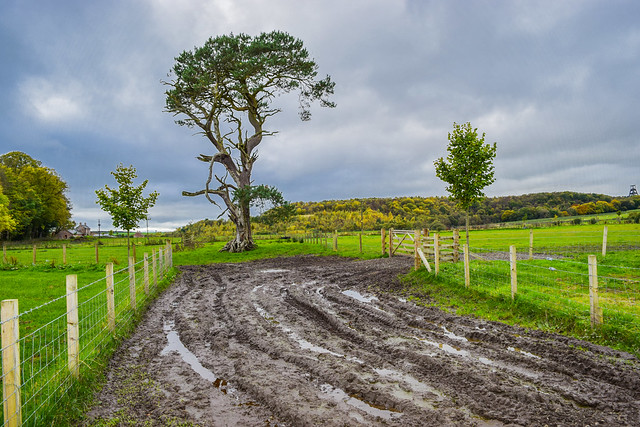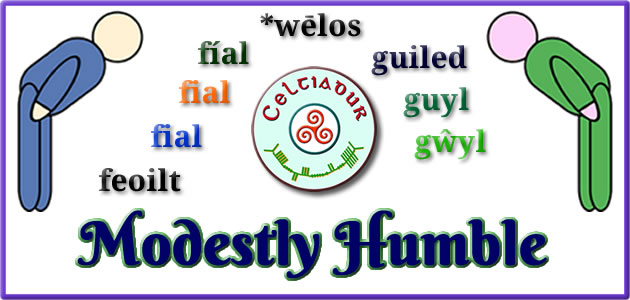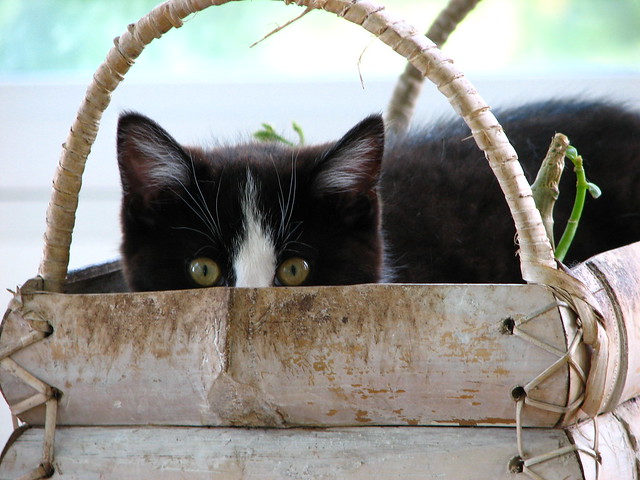Words for mud and related things in Celtic languages.

Words marked with a * are reconstructions.
| Proto-Celtic |
*latyos = moist |
| Old Irish (Goídelc) |
lathach [dʲerɡ] = mud, mire |
| Middle Irish (Gaoidhealg) |
lathach, laithech, lathaig = mire, puddle, quagmire, morass |
| Irish (Gaeilge) |
lathach [ˈl̪ˠɑhəx / l̪ˠaiç] = mud, slush, slime |
| Scottish Gaelic (Gàidhlig) |
lathach [l̪ˠa.əx] = mire, ooze, sludge, quicksand
lathach-mhòine = peat-bog
lathach sàile = saltmarsh
lathachach [l̪ˠa.əxəx] = muddy, oozy, sludgy
lathachail [l̪ˠa.əxal] = muddy, oozy, sludgy
lathadh = besemearing, (be)numbing, heat (in cats) |
| Manx (Gaelg) |
laagh = mire, mud
laagh vog = sludge
laaghagh = muddy, sludgy, slushy
laaghan = muddy place, slough |
| Proto-Brythonic |
*llėd = mud |
| Middle Welsh (Kymraec) |
llaid = mud, mire, dirt, clay, slime, ooze
lleidyawc = muddy, clayey, miry, oozy, slimy |
| Welsh (Cymraeg) |
llaid [ɬai̯d] = mud, mire, dirt, clay, slime, ooze, quagmire, quicksand, dregs
lleidfa = muddy or clayey place
lleidfysgaf, lleidfysgu = to, knead, work clay, bespatter with mud or dirt, bedraggle, bemire
lleidiaf, lleidio = to turn into mud or clay, become sodden
lleidiog = muddy, clayey, miry, oozy, slimy
lleidiogaf, lleidiogi = to become muddy or miry
lleidiogrwydd = muddiness, ooziness, turbidity
lleidiol = full of mud, muddy, miry, clayey |
| Middle Cornish (Cernewec) |
lued, luth, lyys, lys, lŷs = mud, mire, dirt, filth
luedic = miry, filthy, stinking
lyys haal = salt-marsh |
| Cornish (Kernewek) |
leys [lɛɪz] = mud, slime
leysek = mire |
| Middle Breton (Brezonec) |
lec’hid = slime, silt |
| Breton (Brezhoneg) |
lec’hid = slime, silt
lec’hidadur = siltation
lec’hidan, lec’hidañ = to silt up, become gelatinous, viscous
lec’hideg = mudflat
lec’hidus = muddy |
Etymology from Proto-Indo-European *lat- (damp, wet). Words from the same roots include latex in English, latãkas (chute, gutter, duct) in Lithuanian, and lag (to wet, moisten) in Albanian [source].
| Old Irish (Goídelc) |
láp = mud, mire, sin, vice |
| Middle Irish (Gaoidhealg) |
láip [l͈aːb] = mud, mire, sin, vice |
| Irish (Gaeilge) |
láib [l̪ˠɑːbʲ/l̪ˠæːbʲ] = mud, mire; to muddy, spatter
caoch láibe = mole
oitir láibe = mud-bank |
| Scottish Gaelic (Gàidhlig) |
làb [l̪ˠaːb] = mire, mud, muddy puddle, day’s labour
làbach [l̪ˠaːbəx] = marsh, swamp
làbachas [l̪ˠaːbəxəs] = swampiness, bogginess
làban [l̪ˠaːban] = mire, mud, muddy place, dirty work, drudgery, wet and muddy person
làbanachadh [l̪ˠaːbanəxəɣ] = smearing, daubing, dirtying, wallowing, bedraggling, drenching
làbrach [l̪ˠaːbarəx] = miry, muddy, dirty, dirty/unkempt person |
| Middle Cornish (Cernewec) |
loob = slime, sludge |
| Cornish (Kernewek) |
loub = slime, sludge
louba = to lubricate |
Etymology: probably related to lathach [source].
| Proto-Celtic |
*kʷrīyess = clay |
| Old Irish (Goídelc) |
cré [kʲrʲeː] = clay, earth |
| Middle Irish (Gaoidhealg) |
cré, cre = clay, earth
créda, criadta, criata, creodae = clayey, earthen, fictile (pliable, moldable) |
| Irish (Gaeilge) |
cré = clay, earth, dust
créachadh = (act of) earthing, moulding
créafóg = clay, earth
crécholúr = clay pigeon
cré-earra = earthenware
créúil = clayey, earthy |
| Scottish Gaelic (Gàidhlig) |
criadh [krʲiəɣ] = clay
criadgadair [krʲia.ədɪrʲ] = potter
criadhadaireachd [krʲia.ədɪrʲəxg] = pottery |
| Manx (Gaelg) |
cray = ash, clay, pipe clay
crayee = ceramic, earthen
crayoil = clayey, earthy |
| Proto-Brythonic |
*prið [ˈpriːð] = clay, mud, earth |
| Middle Welsh (Kymraec) |
prid, pridd = soil, earth, dust, ground, clay, mortar, plaster
priddo = to cover with earth, bury
pridell, priddell = clod, sod, dust, soil
priddled, priddlyd = earthy, earthen, dirty, dusty, |
| Welsh (Cymraeg) |
pridd [priːð] = soil, earth, dust, ground, clay, mortar, plaster
priddach = soil, earth, clay, earthenware
pridd(i)af, pridd(i)o = to cover with earth, bury, plaster, daub
priddawr = potter
pridd-dom = dirt, mud, clay
priddell = clod, sod, dust, soil, grave, potsherd, brick, tile
priddfaen = brick, (earthenware) tile for making bricks
priddl(l)yd = earthy, earthen, dirty, dusty, uncouth
priddwr = mason, plasterer, burier |
| Middle Cornish (Cernewec) |
pri, pry, prî = mould, earth, clay
prian, prían = clayey ground |
| Cornish (Kernewek) |
pri = clay, mud
priek = clayey
prien = clay ground
priweyth = pottery
priweythor, priweythores = potter
priweythva = clay-works, pottery |
| Old Breton (Brethonoc) |
pri = clay, mudt |
| Middle Breton (Brezonec) |
pry = clay, mud |
| Breton (Brezhoneg) |
pri [priː] = clay, mud, mortar
priaj = ceramic
prian, priañ = to coat with clay
priasell = waste, quagmire
priasellek = full of clay mud
prieg = clayey, muddy |
Etymology possibly from Proto-Indo-European *krey- (to siftm separate, divide). Words from the same roots include latex in English, latãkas (chute, gutter, duct) in Lithuanian, and lag (to wet, moisten) in Albanian [source].
| Middle Breton (Brezonec) |
fanc, fancq, fang, fank = mud, excrement |
| Breton (Brezhoneg) |
fank [ˈfãŋk] = mud, excrement
fankan, fankañ = to poop
fankeg = muddy |
Etymology from Norman fanque (mud) [source] from Old French fange (mud, addle, mire), from Vulgar Latin *fanga/*fangus (mud), possibly from Frankish, from Proto-Germanic *fanją (swamp, fen). The French words fange (filth, mire, debauchery) and fagne (marshland, fen), and the Catalan word fang (mud) come from the same roots [source].
| Middle Welsh (Kymraec) |
llaka, lacca, llacca = mud, sludge, mire, dirt, muck, puddle, filth, slome |
| Welsh (Cymraeg) |
llaca [ɬaka] = mud, sludge, mire, dirt, muck, puddle, filth, slime
llaceilyd = muddy, miry, dirty |
Etymology from Middle English lake/laca (lake, stream; ditch, drain, sewer), from Old French lac (lake) or Latin lacus (lake, basin, tank), to-Italic *lakus (lake), from Proto-Indo-European *lókus (pond, pool) [source].
| Proto-Celtic |
*lutā = dirt, mud |
| Gaulish |
*lutos = swamp |
| Celtiberian |
*lutā = swamp |
| Old Irish (Goídelc) |
loth [ˈloθ] = mire, mud, swamp, marsh |
| Middle Irish (Gaoidhealg) |
loth, lath = mud, mire, quagmire, marsh |
| Irish (Gaeilge) |
lodair = to cover with mud, muddy, to wallow in mire, grovel
lodán = stagnant pool, puddle
lodar = miry place, slough, soft, flabby person
lodartha = muddy, slushy, slobby, soft, flabby, grovelling, abject, base, vulgar
lodarthacht = muddiness, slushiness, softness, flabbiness, abjectness, baseness, vulgarity |
| Scottish Gaelic (Gàidhlig) |
lod [l̪ˠɔd] = pool, pond, marsh
lodagan = small pool of water
lodan = puddle, small pool, small marsh |
Etymology from Proto-Indo-European *lew- (dirt, mud) [source].
Lutetia, the Gallo-Roman town founded in 52 BC that became Paris, gets it’s name from the Gaulish word *lutos (swamp) [source]. It was known as Lutetia Parisiorum by the Romans.

Sources: Wiktionary, Am Faclair Beag, Online Manx Dictionary, Teanglann.ie, eDIL – Electronic Dictionary of the Irish Language, In Dúil Bélrai English – Old Irish glossary, Geiriadur Prifysgol Cymru, Gerlyver Kernewek, Dictionaire Favereau, TermOfis, English – ProtoCeltic WordList (PDF), Etymological Dictionary Of Proto Celtic













